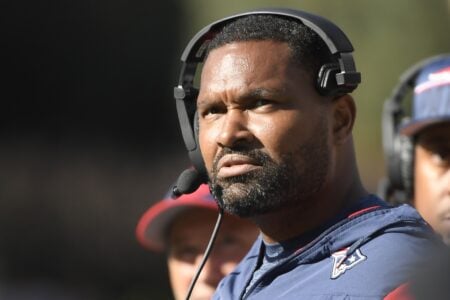I think you are comparing apples and oranges (in the top half of your post).
To disect the stats of 2 individual players who have similar overall numbers, accounting for what is 'inside the stats' is very valuable. But when you are judging the success of a unit and the goal is clearly definable, that definable goal is the yardstick.
There is an equally definable goal with individual players. A RB's goal is to get as many yards per carry as possible.
There are dozens of factors that can make any individual defensive stat a larger or smaller impact on the end result of a defense. You use 3rd down, but thats a very incomplete yardstick. If I am getting torched on 1st and 2nd and allowing a ton of points, but when I do get to a 3rd I stop them pretty well, I am still getting torched. What percentage of 1st downs occur on 3rd down? Not as high as you imply.
You're missing the point, but rather than explain it myself I'll outsource to Mike Vrabel (quote from Christopher Price):
According to linebacker Mike Vrabel, the recent string of third down success is not the result of a new defensive wrinkle, but can be directly attributed to what New England has been doing when it comes to first and second down. "Third-and-eight, third-and-nine, third-and-10, whatever it is, it's a lot easier to defend and get off the field than third-and-two or third-and-three," Vrabel said. "I think if we do a better job on first and second down, then third down is going to start looking a lot better. And in turn, they won't get as many opportunities. They're not going to get 70 to 75 plays a game, and things are going to start to look better."
Third down percentage is absolutely
not strictly a measure of third down performance. It's equally a measure of first and second down performance.
If my defensive philosphy is all out aggressive, in obvious passing downs I may allow fewer firsts, but I will allow a ton of big plays. How is that factored in your stats?
Against a decent QB, you'll allow more first, since there will always be open receivers. So your third down percentage will tend to be worse.
They CORRELATE well to success. That doesn't mean they are a better measure of success than the actual success.
It's correlation through causation.
The stats you use when discussing RBs revolve around what? Success. Because there isnt a success stat. With a defensive unit there is a finite success stat.
Yes, but it's more than a little disingenuous to measure entirely by the endpoint when the starting point is never the same, isn't it? When the teams that start with the best field position have to cover, on average, 10% less field than the teams that start with the worst field position, they's going to skew the hell out of every volume stat out there. If you don't have a problem with that, then I can't very well convince you to, but I will say that that's one of the most elementary statistical stats that you can possibly make. You learn not to do that in 101-level undergrad stats courses.
To say judging a defense by its contribution to winning the game, ie how many points it scored compares to saying # of SBs is the judgment of your running is assinine and insulting.
It's a more extreme manifestation of that type of thinking, yes, but it's a product of the same analytical pitfalls.
As far as time of possession, there are 2 components. 1 is keeping the ball, the other is getting it back. Only in an argument with a preconcevied conclusion can you say the time your defense allows the opponent to possess the ball is less of a factor in time of possession that the time you possess it yourself. It is by definition, the cumulative result of both, added eqaully.
Since baseball analogies work really well here, apparently, let's go with OBP. How do you determine OBP? Hits plus walks. Does that mean that hits and walks contribute equally to OBP? Of course not. In much the same way that 7 and 3 don't 'contribute equally' to 10.
As I said: For some teams, the defense contributes more to TOP, because it consistently forces 3 and outs and turnovers. For some teams, the offense does, because it almost never allows 3 and outs and doesn't commit turnovers.
The offense, IMO, was severely underrated in this respect. On a per-drive basis, the Broncos were the only team that punted less frequently than the Pats. That's why the Patriots' defense had only 920 plays from scrimmage, which was #1 in the NFL. Yet you're trying to compare them, without adjustment, to teams that had almost 1100 plays from scrimmage. That's ridiculous, and whatever flaws there are in the 3rd down % statistic (and there certainly are some-every statistic has flaws) pale in comparison to that.


















